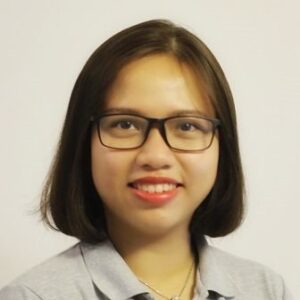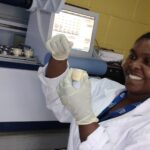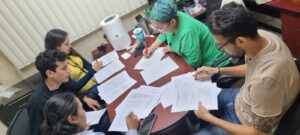
A Conversation with Phan Anh Thu on Being a Woman Researcher in Vietnam
Following on from yesterday’s blog post and our AuthorAID blog celebrating and reflecting on the International Day of Women and Girls in Science, we are pleased to publish our first interview of this mini-blog series. INASP programme assistant Maisie Northing and AuthorAID community administrator Aastha Subedi have spoken with several AuthorAID stewards and members, asking them about their career journey as a woman, their opinions and thoughts on ways more equitable opportunities for women and girls could be achieved, and what advice they would give their younger selves and young researchers.
Enjoy hearing from Phan Ahu Thu, the first of our interviewees for this week!
Phan Anh Thu is a lecturer who teaches Environmental law at The University of Law – Hue University in Vietnam. Her current role immerses her in doing research in the field of environmental law and sustainable development. She is also an AuthorAID foundational steward.
What has been the most exciting part of your research in the past year?
The opportunity to become an AuthorAID foundational steward has been the most exciting part for me last year; the year was not easy for me in terms of my research. I got lost a lot, and I cannot find a suitable mentor. I tried to do some research, write up some papers, and attend some conferences, but I got rejected many times, which was depressing. But then I found the opportunity to become an AuthorAID steward. Now I’m in the team, I feel I am learning more, not only about research, but a lot of other knowledge, for example AI in research, which I had never heard of before in Vietnam. I am able to reap the benefits for my students too, who are also lost in their research interests. Being an AuthorAID steward has helped me to meet more like-minded people who I can learn from, and also grow my network. I can bring some benefits to my own community as well.
If you could do one thing to change the research landscape for women and girls, what would it be?
There are some older ideologies that still prevail in parts of Vietnamese society, that if you are a woman and you get a master’s degree or a PhD, it will be very difficult for you to find a lifelong partner, because many Vietnamese men do not want to marry a woman with a higher degree. Some think that women may be smarter than them, and that it will be hard for them to control the family. In addition, some think that if women are professionally successful, they have to find a man who more successful than them to form a great match. So, many Vietnamese academics, especially from my region, are afraid of getting a higher degree, or they may defer that dream to dive deep into research until after they find a husband and have a family. I think that is the worst barrier for us. I don’t know how to change the perspective now, but I think that’s the thing we have to change and overcome first, before we think about other barriers. Then, we can actually encourage women to pursue their dreams of being a successful academic. This has to be changed in Vietnam in particular, and I think in some other Asian societies in general.
Can you tell us who your women role models and inspiration have been, and do you have a particular woman scientist or researcher who you currently admire and why?
I have a lot of role models! My professors are mostly women, and they are very successful in their academic careers. Currently I really admire Professor Sundhya Pahuja. She was one of my lecturers at the University of Melbourne and she is very inspirational, through the way she teaches and conducts research. Speaking with her really changed my mind about how to approach doing research. At first after my master’s degree, I didn’t want to take any time before doing my PhD, but the professor told me that it is very difficult to study a PhD in law, and that I should take some time to dive deep into the field. She recommended that my knowledge and experience wasn’t enough yet to go ahead with a PhD, so advised that I take a gap year to enrich my knowledge and skill, and that she would help me to sharpen my research skills. That wasn’t an easy thing to hear at the time, but she wanted me to know the truth, so I didn’t have any misunderstanding, or suffer from rejection. I nearly cried, but I feel very grateful for that, because I have had time to refresh and learn about myself and improve. My professor also won the Best Lecturer of the Year Award at the University of Melbourne; she is very inspirational, and also impressive to me.
What would you like to see in your own country’s context to pave the way for more women and girls to succeed in research?
In Vietnam, citing others’ work is not paid enough attention to. It forms very bad habits for my students in their assignments. We do have some form of training for it, but it is not always taken into account. In Vietnam we need to teach students how to conduct proper research, as we have a form of template for students, but they then use that to do their own research, dissertation, or thesis. There isn’t enough teaching on research ethics. I have taken a lot of courses from AuthorAID at INASP and other sources to ensure I know how to properly do research. Research ethics teaching would benefit both women and men to be able to contribute to science.
One interesting thing in my own university is that we have more women, and they are very successful, holding critical roles in the university. But the senior leadership structure is still male dominated.
Finally, could you please share one piece of advice or recommendations you would offer to your younger self or to younger female scholars?
I think the most important thing is searching for help from seniors. I used to be very shy in approaching seniors to ask for help, so I just tried to do everything myself, and that is not good! That is the thing I would tell my younger self, and younger female scholars – try to grow your network and search for help wherever you can. Many people really want to offer you a hand, but they don’t know if you need it or not. Sometimes I thought that person is so successful, and they wouldn’t be available to help me, but you don’t know until you ask. Now I ask for help; the worst thing that could happen is they can’t help you – and that is fine, you can then ask someone else, or they might introduce you to someone else, which is even better. I think we have to overcome the fear of rejection.
We are grateful to Phan Anh Thu for her time and willingness to share her experiences and thoughts with us. We hope you have enjoyed reading this blog and are excited for the next interview tomorrow, in which Nafisa M K Elehamer tells us about challenges, mentorship, and more!
Title image: Vlad Tchompalov, Unsplash


 Previous Post
Previous Post Next Post
Next Post


